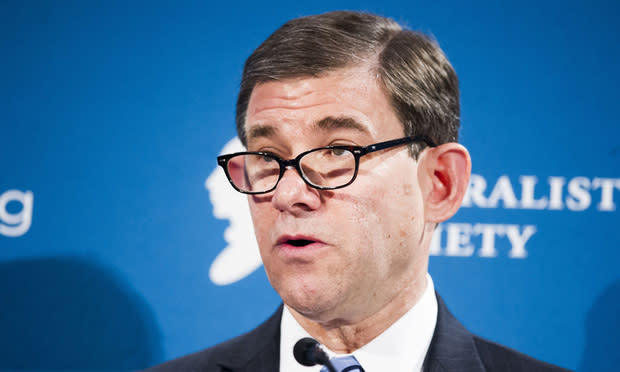Judge Pryor, UGA Among Top 11th Circuit Feeders for Supreme Court Clerks

Judge William Pryor, U.S. Court of Appeals for the Eleventh Circuit. Photo: John Disney/ ALM.The Eleventh Circuit Court of Appeals, which includes Georgia, Florida and Alabama, is not among the most productive when it comes to providing clerks to the U.S. Supreme Court, with four of the judges sending a combined 18 lawyers since 2005. Most of those lawyers found slots with conservative Justices Clarence Thomas and Samuel Alito, although Chief Justice John Roberts, Justice Anthony Kennedy and retired Justice John Paul Stevens sought out talent recommended by the Eleventh’s jurists. Eight clerks from the Eleventh were women. One Asian man and one Hispanic-Caucasian woman were also included in the tally. The circuit sent no black clerks to the high court. With six graduates moving on to Supreme Court clerkships, the University of Georgia School of Law ranks No. 14 among law schools providing the justices’ staff attorneys. The dean of University of Georgia's law school, Peter “Bo” Rutledge—who clerked for Fourth Circuit Court of Appeals Judge J. Harvie Wilkinson III before going on to clerk for Thomas—said the school has a multifaceted approach targeting students interested in clerkships. Asked whether the University of Georgia deliberately reaches out to minority or female students for potential clerkships, Rutledge said the program instead seeks to be as inclusive as possible. “I would say our attitude is very ecumenical,” he said. “Our programs are open to all our students.” Whether to apply, he said, is an individual choice but one the law school supports. “Clerkships are important in two respects,” said Rutledge. “They are an opportunity for students of all stripes to serve their country.” “Secondly, from a professional development perspective, they provide an opportunity to observe and grow one’s awareness of how dispute are resolved in court. …," he said. "What emerges from a clerkship is a newfound awareness of the role a judge plays in society and the indispensable function it serves.” The circuit judges who have sent clerks to the high court declined to be interviewed. Judge William Pryor, a graduate of Tulane University School of Law with an undergraduate degree from Northeast Louisiana University, is by far the most prolific source of clerks for the justices, sending 11 to Washington since he was appointed in 2005. Pryor’s recommendations have leaned heavily on the University of Chicago School of Law, which provided four of the clerks he sent on to the high court. Pryor sent three Yale law grads northward, along with two Duke alumni and one Harvard grad. Seven Pryor recommendations went to work for Thomas, including one who was first tapped by the late Justice Antonin Scalia prior to his death last year. Three Pryor clerks went on to serve Alito, and one went with Justice Anthony Kennedy. Harvard law graduate and Chief Judge Ed Carnes sent three clerks to the Supreme Court since 2005, all of whom went to work for Thomas. Senior Judge Lanier Anderson, also a Harvard law alumnus, provided two UGA law grads, one to Roberts and one to Kennedy. Judge Susan Black sent one former clerk to the high court, where she worked for Stevens. Rutledge said UGA prioritizes the law school's relationship with the judiciary, especially through the programs it offers. One of those is a “fairly robust and sophisticated program to educate students about opportunities and the processes involved for clerking,” he said. “We have a dedicated faculty member and a career development officer who work hand-in-glove to arrange programs that educate students about these opportunities.” In the fall, he said, the school offers a “Should I clerk?” development session that allows students to listen to and meet judges and former clerks and discuss the benefits of seeking out a clerkship. “Then, in the spring, you’d be invited to a ‘Nuts and Bolts’ session designed to educate students about the elements of the package,” Rutledge said. “There’s a variety of other things we do,” he said. “For example, we encourage students as they write to think about their papers as potential writing samples, or as elements of a letter a prospect would send to a judge.” In addition to such “inward-looking” endeavors, Rutledge said a third part of the equation is the “external-facing strategy.” “That’s an effort to connect with the judiciary either on or off campus,” he said. “We invite a diverse array of judges from around the country to come speak to students, to serve as guest instructors. It also gives the judges a sense of who our students are.” “Off campus, we attend judicial conferences, visit judges at bar events – again, to try to convey in a very authentic way to the judiciary that the University of Georgia Law School takes that relationship very seriously.”

